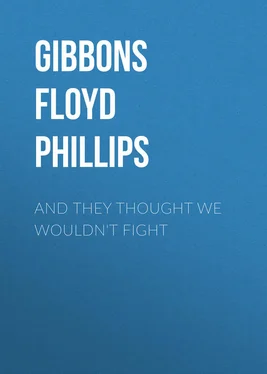Floyd Gibbons - And they thought we wouldn't fight
Здесь есть возможность читать онлайн «Floyd Gibbons - And they thought we wouldn't fight» — ознакомительный отрывок электронной книги совершенно бесплатно, а после прочтения отрывка купить полную версию. В некоторых случаях можно слушать аудио, скачать через торрент в формате fb2 и присутствует краткое содержание. Издательство: Иностранный паблик, Жанр: История, foreign_antique, foreign_prose, на английском языке. Описание произведения, (предисловие) а так же отзывы посетителей доступны на портале библиотеки ЛибКат.
- Название:And they thought we wouldn't fight
- Автор:
- Издательство:Иностранный паблик
- Жанр:
- Год:неизвестен
- ISBN:нет данных
- Рейтинг книги:4 / 5. Голосов: 1
-
Избранное:Добавить в избранное
- Отзывы:
-
Ваша оценка:
- 80
- 1
- 2
- 3
- 4
- 5
And they thought we wouldn't fight: краткое содержание, описание и аннотация
Предлагаем к чтению аннотацию, описание, краткое содержание или предисловие (зависит от того, что написал сам автор книги «And they thought we wouldn't fight»). Если вы не нашли необходимую информацию о книге — напишите в комментариях, мы постараемся отыскать её.
And they thought we wouldn't fight — читать онлайн ознакомительный отрывок
Ниже представлен текст книги, разбитый по страницам. Система сохранения места последней прочитанной страницы, позволяет с удобством читать онлайн бесплатно книгу «And they thought we wouldn't fight», без необходимости каждый раз заново искать на чём Вы остановились. Поставьте закладку, и сможете в любой момент перейти на страницу, на которой закончили чтение.
Интервал:
Закладка:
Immediately the cheering changed to a tremendous clamorous demand for the General's appearance on the balcony in front of his apartments.
" Au balcon, au balcon ," were the cries that filled the Place. The crowd would not be denied.
General Pershing stepped forth on the balcony. He stood behind the low marble railing, and between two enormous white-stoned columns. A cluster of the Allied flags was affixed to each column. The American commander surveyed the scene in front of him.
There are no trees or shrubbery in the vast Place de la Concorde. Its broad paved surface is interrupted only by artistically placed groups of statuary and fountains.
To the General's right, as he faced the Place, were the trees and greenery of the broad Champs Elysées. On his left were the fountains and the gardens of the Tuilleries. At the further end of the Place, five hundred feet straight in front of him, were the banks and the ornamental bridges of the Seine, beyond which could be seen the columned façade of the Chambre des Deputies, and above and beyond that, against the blue sky of a late June afternoon, rose the majestic golden dome of the Invalides, over the tomb of Napoleon.
General Pershing looked down upon the sea of faces turned up toward him, and then it seemed that nature desired to play a part in the ceremony of that great day. A soft breeze from the Champs Elysées touched the cluster of flags on the General's right and from all the Allied emblems fastened there it selected one flag.
The breeze tenderly caught the folds of this flag and wafted them across the balcony on which the General bowed. He saw and recognised that flag. He extended his hand, caught the flag in his fingers and pressed it to his lips. All France and all America represented in that vast throng that day cheered to the mighty echo when Pershing kissed the tri-colour of France.
It was a tremendous, unforgettable incident. It was exceeded by no other incident during those days of receptions and ceremonies, except one. That was an incident which occurred not in the presence of thousands, but in a lonely old burial ground on the outskirts of Paris. This happened several days after the demonstration in the Place de la Concorde.
On that day of bright sunshine, General Pershing and a small party of officers, French and American, walked through the gravel paths of Picpus Cemetery in the suburbs of Paris, where the bodies of hundreds of those who made the history of France are buried.
Several French women in deep mourning courtesied as General Pershing passed. His party stopped in front of two marble slabs that lay side by side at the foot of a granite monument. From the General's party a Frenchman stepped forward and, removing his high silk hat, he addressed the small group in quiet, simple tones and well-chosen English words. He was the Marquis de Chambrun. He said:
"On this spot one can say that the historic ties between our nations are not the result of the able schemes of skilful diplomacy. No, the principles of liberty, justice and independence are the glorious links between our nations.
"These principles have enlisted the hearts of our democracies. They have made the strength of their union and have brought about the triumph of their efforts.
"To-day, when, after nearly a century and a half, America and France are engaged in a conflict for the same cause upon which their early friendship was based, we are filled with hope and confidence.
"We know that our great nations are together with our Allies invincible, and we rejoice to think that the United States and France are reunited in the fight for liberty, and will reconsecrate, in a new victory, their everlasting friendship of which your presence to-day at this grave is an exquisite and touching token."
General Pershing advanced to the tomb and placed upon the marble slab an enormous wreath of pink and white roses. Then he stepped back. He removed his cap and held it in both hands in front of him. The bright sunlight shone down on his silvery grey hair. Looking down at the grave, he spoke in a quiet, impressive tone four simple, all-meaning words:
"Lafayette, we are here."
CHAPTER III
THE LANDING OF THE FIRST AMERICAN CONTINGENT IN FRANCE
The first executive work of the American Expeditionary Forces overseas was performed in a second floor suite of the Crillon Hotel on the Place de la Concorde in Paris. This suite was the first temporary headquarters of the American commander.
The tall windows of the rooms looked down on the historic Place which was the scene of so many momentous events in French history. The windows were hardly a hundred yards from the very spot where the guillotine dripped red in the days of the Terror. It was here that the heads of Louis XVI and Marie Antoinette dropped into the basket.
During General Pershing's comparatively brief occupancy of these headquarters, the reception rooms were constantly banked with fresh-cut flowers, the daily gifts of the French people, – flowers that were replenished every twenty-four hours. The room was called the "Salon des Batailles."
In one corner of the room, near a window overlooking the Place, was General Pershing's table. It was adorned with a statuette of General Joffre and a cluster of miniatures of captured German standards. Extending from the floor to the ceiling on one of the walls were two enormous oil copies of "La Bataille de Fontenoy" and the "Passage du Rhin." A large flag-draped photograph of President Wilson occupied a place of honour on an easel at one end of the room.
During the first week that General Pershing stopped at the hotel, the sidewalk and street beneath his windows were constantly crowded with people. The crowds waited there all day long, just in the hope of catching a glimpse of the American commander if he should happen to be leaving or returning to his quarters. It seemed as if every Parisienne and Parisian had taken upon herself and himself the special duty of personally observing General Pershing, of waving him an enthusiastic "vive" and possibly being within the scope of his returning salute.
But the American commander would not permit demonstrations and celebrations to interfere with the important duties that he faced. Two days are all that were devoted to these social ceremonies which the enthusiastic and hospitable French would have made almost endless. Dinners, receptions and parades were ruthlessly erased from the working day calendar. The American commander sounded the order "To work" with the same martial precision as though the command had been a sudden call "To arms."
On the morning of the third day after General Pershing's arrival in Paris, the typewriters began clicking incessantly and the telephones began ringing busily in the large building which was occupied on that day as the headquarters of the American Expeditionary Forces in France.
This building was Numbers 27 and 31 Rue de Constantine. It faced the trees and shrubbery bordering the approach to the Seine front of the Invalides. The building was two stories high with grey-white walls and a mansard roof. At that time it could be immediately identified as the one in front of which stood a line of American motor cars, as the one where trim United States regulars walked sentry post past the huge doors through which frequent orderlies dashed with messages.
Ten days before, the building had been the residence of a Marquis and had contained furniture and art valued at millions of francs. All of those home-like characteristics had been removed so effectively that even the name of the kindly Marquis had been forgotten. I am sure that he, himself, at the end of that ten-day period could not have recognised his converted salons where the elaborate ornamentation had been changed to the severe simplicity typical of a United States Army barracks.
Читать дальшеИнтервал:
Закладка:
Похожие книги на «And they thought we wouldn't fight»
Представляем Вашему вниманию похожие книги на «And they thought we wouldn't fight» списком для выбора. Мы отобрали схожую по названию и смыслу литературу в надежде предоставить читателям больше вариантов отыскать новые, интересные, ещё непрочитанные произведения.
Обсуждение, отзывы о книге «And they thought we wouldn't fight» и просто собственные мнения читателей. Оставьте ваши комментарии, напишите, что Вы думаете о произведении, его смысле или главных героях. Укажите что конкретно понравилось, а что нет, и почему Вы так считаете.












